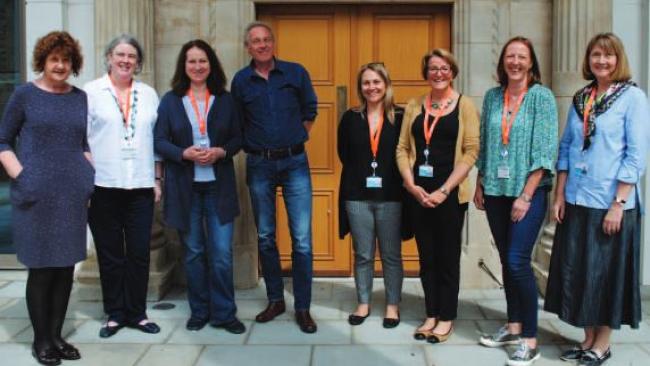
Prof Catherine Rûˋgis
Catherine is an Intellectual Forum Senior Research Associate.
Catherine Rûˋgis is Full Professor at the Faculty of Law of Universitûˋ de Montrûˋal (UdeM) and Director of Social Innovation and International Policy at IVADO, Canadaãs most important research, training and knowledge mobilization consortium in artificial intelligence (AI). In addition to holding a Canada CIFAR Chair in AI and Human Rights and a Canada Research Chair in Health Law and Policy, she is an Associate Academic Member at Mila, one of the worldãs largest academic research centres in machine learning. From 2021 to 2023, she was also UdeMãs Associate VP for Strategic Planning and Responsible Digital Innovation.
Prof Rûˋgis is very active on the international scene. In 2022, she was appointed Cochair of the Working Group on Responsible AI of the Global Partnership on AI (GPAI), which comprises 29 member states (including Canada, France, Germany, India, Japan and the USA) for a period of two years. From 2020 to 2024, she led the Working Group on Responsible Digital Innovation and AI of the U7+ Alliance, which includes more than 50 universities from around the world. In 2022, she was a selected Fellow for the UNãs Institute for Training and Researchãs program (UNITAR) in Science Diplomacy and, in 2024, she became part of the Technical Committee for UNESCOãs AI and the Rule of Law Program.
Prof Rûˋgis is used to executing consulting or training assignments both in Canada and elsewhere. She has been a visiting professor in different countries, and she has presented her work at institutions such as the OECD, the World Health Organization, the United Nations Institute for Disarmament Research, the Alan Turing Institute, the Supreme Court of Canada, and the Aspen Ministers Forum; in more than 20 universities worldwide (e.g., Costa Rica, Edinburgh, Georgetown, Osaka, Oxford, Sciences Po Paris, Sorbonne, Toronto); and in high-level conferences, including the AI Safety Summit at Bletchley Park in 2023 and NeurIPS. She is involved in the development of Science Diplomacy (which aims at building leadership and communication skills to bridge science and diplomacy in policymaking) at the national and international levels. She also guides governments and public organizations (e.g., academic health centres, ombudspeople and ministries of health or innovation) on policy orientation and responsible AI projects.
What are you working on now?
I have two main streams of research activities:
1) Responsible AI
I design and conduct research projects on the governance of AI at the national and international levels. My main objectives are: 1) to ensure human rights considerations are integrated throughout the AI life cycle; 2) to help policymakers map out and implement normative strategies that will contribute to the equitable distribution of AI benefits across nations; and 3) to inform the creation of the regulatory and governance tools needed for the responsible design and deployment of AI in key systems like healthcare and justice.
2) Health Law and Policy
I conduct various research projects on health law and policies contemporary challenges, such as the renewed role of the medical profession and of the normative leadership of the World Health Organization. I recently coauthored a book on that subject that is pertinent for our countriesã decisionmakers and medical associations: J.-L. Denis, S. Germain, C. Rûˋgis and G. Veronesi, Medical Doctors in Health Reforms ã A Comparative Study of England and Canada, Policy Press, Bristol, 2021, 237 p.
How has your career to date led to this?
I started my career as a legal scholar specialized in health law and policy, exploring a variety of topics such as the development of alternative dispute resolution mechanisms in health care (mediation and partnering), the elaboration of collaboration duties among health care professionals in healthcare and patientsã rights in general. I moved more intensively into the governance of AI and digital innovation in 2017, when I was given the opportunity to work on the development of the Montreal Declaration on Responsible AI. After that project, I became fascinated by the impacts that AI has, and will increasingly have, on many key components of our daily life and social programs like health care and justice. I realized that legal scholars would have an important contribution to make in upcoming years regarding the governance of such a powerful technology, and I wanted to join that endeavour.
What one thing would you most want someone to learn from what youãve done or are doing now?
I have always been driven by the will to do interdisciplinary and multistakeholder work, so I often collaborate with people from various disciplines (e.g., management, medicine, computer science, philosophy, psychology) and sectors (e.g., civil society, government, industry, international organizations) to improve my understanding of the governance of AI and health law and policy issues and to create solutions that are relevant and add value in the real world. This can certainly be challengingãand it is not yet that common in legal scholarshipãbut I could not imagine doing things differently now. As Oliver W. Holmes said, a mind stretched to a new idea or experience never goes back to its original dimension.
What do you think of äâëñä¾åÙÇÇ and the Intellectual Forum?
In March 2024, Maria Axente and I had the privilege to launch a book on Human-Centered Artificial Intelligence at äâëñä¾åÙÇÇãs Intellectual Forum. I was very impressed and stimulated by the quality of the discussions we had with Jesusãs community during this event. These triggered my interest in becoming part of that community and actively contributing to ãand benefiting fromã its intellectual life. As a research associate to the Intellectual Forum, I hope to participate in new collaborative and interdisciplinary projects involving Jesusãs community.
You can meet the rest of the Intellectual Forum team or contact us via email.











